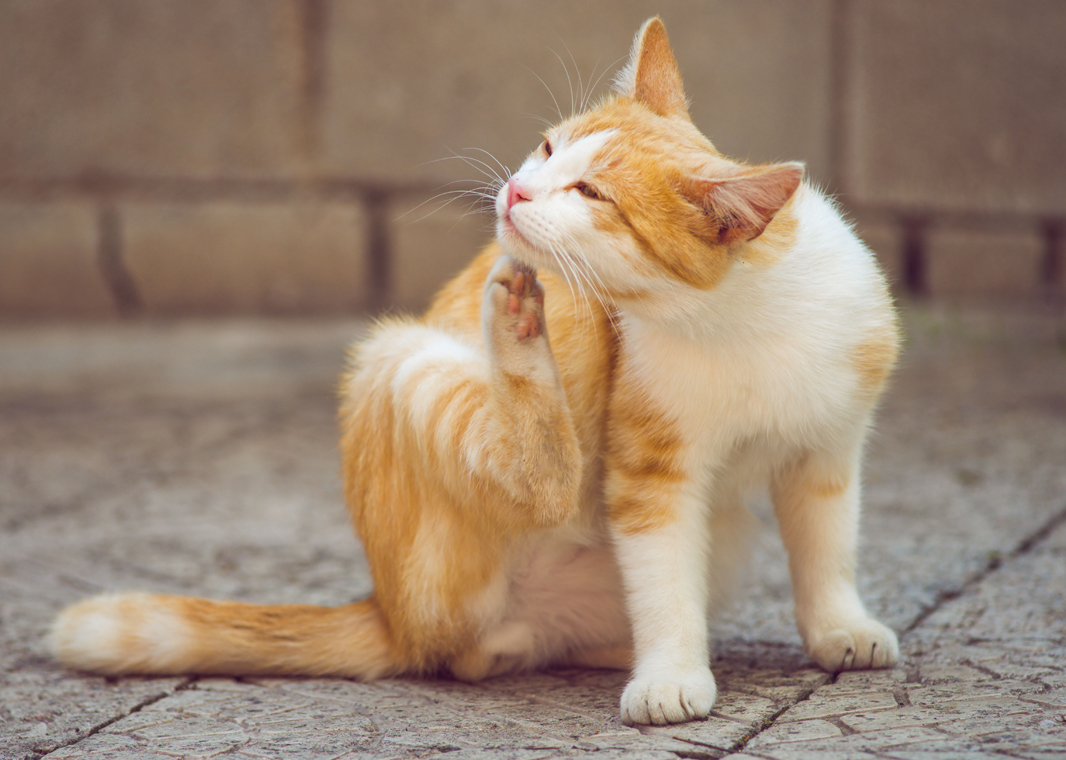The image of a cat grooming its fur is closely associated with cleanliness and hygiene.
However, when scratching becomes persistent and intense, it may indicate an underlying problem that requires our attention.
As pet carers, it’s important to recognize the signs and offer appropriate care to our beloved felines.
What is scratching?
Itching, also known as “pruritus”, is a common symptom in cats and it appears for many reasons. Causes range from mild skin irritations to more serious conditions, like infections.
When cats feel itchy, they use their claws to repeatedly scratch the area that is bothering them. This action releases histamine, a substance that causes inflammation (swelling).
This in turn leads to more itching, and a cycle of itching is created and keeps going on until the cause is treated. Itching affects the way cats feel and act. Cats with itching should be examined by a vet to receive a proper diagnosis so that an appropriate treatment plan can be initiated.
Why do cats scratch themselves?
Scratching is a cat’s natural reaction to skin irritations. Its causes vary from parasites to allergies and skin conditions. Other possible causes could be endocrine disorders (such as hyperthyroidism), autoimmune diseases, cancer, insect bites, stress, exposure to household chemicals, and other irritants. It is important to understand the difference between normal scratching and excessive scratching, which can lead to injury and worsening of the problem.
Possible causes of excessive scratching
- Parasites
Fleas are a common cause of itching in cats, and are usually found on the back of the body, near the tail. You can use a flea comb to find them. Other parasites, such as mites and lice, can also cause intense itching and various skin problems. For mites, your veterinarian may need to take a skin sample and examine it under a microscope.
- Allergies
Cats can be allergic to foods or environmental factors, such as pollen, dust, and mold. Allergies cause an inflammatory response which leads to itching and scratching. Cats can also have an allergic reaction to flea saliva
- Skin Infections
Fungal infections, such as ringworms, are highly contagious and can be transmitted to humans. Other skin problems and yeast infections can also cause itching and irritation. Yeast infections commonly appear on the ears, face, groin, feet, and soles of the feet.
- Nutritional Factors
A diet that does not meet your cat’s needs can lead to dry skin and itching. Tanko offers high-quality foods that enhance the health of cat’s skin and fur. Foods rich in omega-3 fatty acids, vitamin A and probiotics can help with the supporting of sensitive skin.
- Stress
Stress in cats can appear in various ways, including excessive scratching. The same can happen with exposure to irritants, such as household chemicals.
Your cat is itching: when to worry
Generally, itching is not considered a medical emergency, but there are exceptions. If a cat is itching excessively and that causes deep scratches and bleeding because of the damage to their fur and skin, you should take them to the vet for both relief and prevention from infection.
Moreover, if your cat is itching due to an allergic reaction and at the same time it has symptoms like facial swelling, sneezing, or difficulty in breathing, it should be taken to the vet immediately to be treated as a case of emergency.
How is itching diagnosed in cats?
It is simple to diagnose itch. However, the hard part is to find the underlying cause. First, your vet will perform a thorough physical exam to check your cat’s general health. If there are specific areas that your cat is scratching repeatedly, be sure to mention them to your vet for further examination.
A vet may perform tests to find the underlying cause. These tests may include:
● Skin scrapings
● Strip tests
● Fungal cultures
● Allergy tests
● Fine needle aspiration (FNA) biopsy
● Blood tests
● Nutritional testing
● Cytology
Treatment for your cat’s itching
Depending on the underlying cause, the treatment of itching may include a combination of topical and oral medications. The duration of the treatment also varies, as it may be short-term for conditions like an insect bite or long-term for conditions like food allergies.
Possible medications for itchy cats could be:
● Antihistamines
● Corticosteroids
● Flea and tick preventatives, such as Bravecto®
● Omega-3 fatty acids
● Immunomodulatory medications
● Antibiotics
● Antifungals
● Topical anti-inflammatory creams
Advice for your cat’s relief
Besides medical treatment, there are some things you could do at home to relieve your cat from itching:
- Protection from parasites
Use products to prevent and deal with parasites regularly.
- Nutrition of high quality
Choose a cat’s food rich in nutrients and able to support the health of cat’s skin and fur.
● Grooming
Brush your cat regularly to remove dead hair and stimulate blood circulation.
● Bathing
If your cat tolerates it, you can bathe her in lukewarm (not hot) water. There are shampoos specifically designed for cats that moisturize the skin and may reduce itching.
● Stress management
Create a calm and safe environment for your cat.
● Cone
A cone (Elizabethan collar) can prevent excessive scratching and licking, as the latter often makes the condition worse.
Why choosing a quality diet can make a difference to your cat’s itching
Treating your cat’s persistent scratching requires a holistic approach. That’s why relieving the symptom is not enough, you should also care for their overall well-being.
At Tanko, by offering high-quality food for your cat, we build the foundation for a life full of health and happiness – the same quality we offer in every one of our products.








